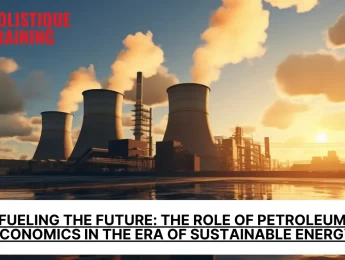- Table of Contents
- What Is Petroleum Economics?
- The Foundation of Petroleum Economics
- Market Dynamics and Pricing
- Investment and Risk Management
- Environmental Considerations
- Policy and Regulation
- The Global Impact
- How Do Oil Prices Influence Global Economies?
- Table 1: The Global Economic Impact of Oil Price Fluctuations
- What Are the Key Factors Driving Petroleum Economics?
- 1. Geopolitical Factors
- 2. Supply and Demand Dynamics
- 3. Technological Advancements
- 4. Regulatory and Environmental Policies
- 5. Market Sentiment and Speculation
- 6. Economic Growth Patterns
- 7. Energy Transition and Climate Change
- How Does Petroleum Economics Affect Environmental Policies?
- Driving Forces behind Environmental Policies
- Impacts of Petroleum Economics on Environmental Policy
- How Can Nations Balance Petroleum Wealth and Sustainable Development?
Introduction
The study of petroleum economics sits at the confluence of energy production, economic policy, and environmental stewardship, offering a comprehensive view of the oil and gas industry's role within the global economy. This field delves into the exploration, extraction, refinement, and distribution of crude oil and natural gas, encapsulating the financial, policy, and environmental considerations that govern these processes. As the backbone of modern energy systems, petroleum economics not only addresses the operational and market dynamics essential to meeting the world's energy needs but also confronts the challenges posed by finite natural resources, geopolitical tensions, and the imperative shift towards sustainability. This introduction sets the stage to explore the multifaceted aspects of petroleum economics, highlighting its significance in navigating the intricate balance between leveraging energy resources for economic development and advancing environmental goals in the era of climate change and renewable energy transition.
What Is Petroleum Economics?
Petroleum economics is a branch of economics that focuses on the exploration, extraction, refinement, and distribution of crude oil and natural gas. It encompasses a wide array of financial, policy, and environmental considerations that influence the global petroleum industry. At its core, petroleum economics analyzes the complex interplay between the supply of and demand for petroleum products, the costs associated with producing these resources, and the geopolitical factors that impact their availability and price.
The Foundation of Petroleum Economics
The foundation of petroleum economics lies in understanding the oil and gas value chain—from upstream activities (exploration and production) to downstream processes (refining, marketing, and distribution). Each stage involves distinct economic analyses to assess project viability, investment returns, and market strategies. The economics of petroleum also considers the finite nature of oil and gas reserves, which introduces unique challenges in resource management, pricing models, and long-term sustainability.
Market Dynamics and Pricing
Central to petroleum economics is the concept of market dynamics and how they influence the pricing of oil and gas. Prices are affected by a variety of factors, including geopolitical events, supply disruptions, technological advancements, and changes in consumer demand. OPEC (Organization of the Petroleum Exporting Countries) plays a significant role in influencing oil prices through its production quotas, which aim to stabilize the market and manage oil revenues for member countries.
Investment and Risk Management
Investing in petroleum projects requires substantial capital and entails significant risks, from geopolitical instability and regulatory changes to environmental challenges and technological uncertainties. Petroleum economics involves the application of financial modeling and risk assessment tools to evaluate investment opportunities, estimate project costs, and forecast future revenues. Risk management strategies are crucial for minimizing losses and ensuring the profitability of petroleum ventures.
Environmental Considerations
Petroleum economics also addresses the environmental impact of oil and gas production, including greenhouse gas emissions, water usage, and habitat disruption. The transition to cleaner energy sources and the implementation of environmental regulations have profound implications for the petroleum industry. Economic analyses are increasingly incorporating the costs of carbon emissions and environmental remediation into project evaluations, influencing investment decisions and shaping the future of energy production.
Policy and Regulation
Government policies and regulations significantly impact petroleum economics, affecting everything from exploration rights and taxation to environmental standards and energy subsidies. Policymakers must balance the economic benefits of petroleum development with the need to protect the environment and promote sustainable energy sources. This involves crafting policies that encourage innovation, ensure market stability, and support the transition to a more sustainable energy mix.
The Global Impact
The petroleum industry is a major driver of the global economy, providing the energy needed for transportation, heating, and electricity generation. The geopolitics of oil can influence international relations, trade balances, and economic development. Petroleum economics studies these global impacts, analyzing how shifts in the energy landscape can affect national economies, energy security, and global market dynamics.
How Do Oil Prices Influence Global Economies?
The influence of oil prices on global economies is profound and multifaceted, touching nearly every aspect of economic activity. Oil, often referred to as "black gold," is a cornerstone energy source that powers industries, transportation, and homes. Its price fluctuations can send ripples across the global economic landscape, affecting everything from inflation rates to trade balances and even geopolitical stability. Here, we delve into the mechanisms through which oil prices impact global economies and the implications of these effects.
One of the most immediate impacts of oil price changes is on inflation. As oil prices rise, the cost of goods and services that depend on oil for production and transportation also increases. This can lead to higher consumer prices for a wide range of products, from gasoline at the pump to goods delivered via freight services. Higher fuel costs can reduce disposable income for consumers, leading to decreased spending on non-essential goods and services, which in turn can slow economic growth.
Conversely, when oil prices fall, it can have a deflationary effect, lowering the cost of transportation and production, which can boost consumer spending and stimulate economic activity. However, too low oil prices can also signal weak global demand, potentially leading to broader economic concerns.
Oil prices significantly influence the trade balances of countries, depending on whether they are net importers or exporters of oil. For oil-exporting countries, high oil prices can lead to increased revenues, improving their trade balances and providing funds for government spending, development projects, and foreign reserves. On the other hand, oil-importing countries may see their trade deficits widen as they spend more on oil imports, potentially weakening their currencies and affecting their ability to import other goods.
The profitability of the energy sector, particularly in oil exploration, production, and refining, is closely tied to oil prices. High prices can incentivize investment in new oil projects and alternative energy sources, while low prices can lead to reduced capital expenditure, project delays, or cancellations. These investment decisions can impact employment, technological innovation, and the long-term supply dynamics of the oil market.
Oil prices also have significant geopolitical implications, as they can affect the economic stability and political power of oil-rich nations. High oil revenues can embolden oil-exporting countries, giving them more leverage on the international stage, while low prices can strain their economies, leading to budget deficits, social unrest, and reduced influence in global affairs.
Central banks closely monitor oil price movements as part of their mandate to manage inflation and promote stable economic growth. Significant changes in oil prices can influence monetary policy decisions, including interest rate adjustments and quantitative easing measures. For instance, persistent high oil prices might prompt central banks to raise interest rates to combat inflation, which can affect borrowing costs, investment, and economic growth.
Finally, oil prices play a role in the global energy transition and the adoption of environmental policies. High oil prices can make renewable energy sources more competitive, accelerating investment in green technologies and initiatives aimed at reducing carbon emissions. Conversely, low oil prices can slow the transition to renewable energy by making fossil fuels more economically attractive.
Table 1: The Global Economic Impact of Oil Price Fluctuations
Impact Area | Effect of High Oil Prices | Effect of Low Oil Prices |
Inflation and Consumer Spending | Increase in the cost of goods and services, leading to higher consumer prices and reduced disposable income for consumers. | Lower cost of transportation and production, boosting consumer spending and stimulating economic activity. |
Trade Balances | For oil-exporting countries: Increased revenues and improved trade balances. | For oil-importing countries: Wider trade deficits due to higher spending on oil imports. |
Energy Sector Investments | Incentivizes investment in new oil projects and alternative energy sources. | Can lead to reduced capital expenditure, project delays, or cancellations in the energy sector. |
Geopolitical Implications | Can embolden oil-exporting countries with increased revenues, enhancing their international leverage. | May strain the economies of oil-rich nations, leading to budget deficits, social unrest, and reduced global influence. |
Central Bank Policies | May lead to interest rate increases to combat inflation, affecting borrowing costs and economic growth. | Low prices can signal weak global demand, potentially leading to broader economic concerns and adjustments in monetary policy. |
Energy Transition and Environmental Policies | Makes renewable energy more competitive, accelerating investment in green technologies. | Can slow the transition to renewable energy by making fossil fuels economically attractive. |
What Are the Key Factors Driving Petroleum Economics?
Petroleum economics, the study of how crude oil and natural gas resources are managed and valued, is influenced by a multitude of factors that drive the industry's dynamics. These factors not only affect the supply and demand of petroleum products but also impact the global economy, environmental policies, and geopolitical relations. Understanding these key drivers is essential for navigating the complex landscape of the petroleum sector. Here, we explore the major factors that shape petroleum economics:
1. Geopolitical Factors
Geopolitical tensions and stability in oil-rich regions can significantly affect oil prices and supply chains. Countries with large oil reserves, such as those in the Middle East, Russia, and Venezuela, play pivotal roles in the global oil market. Political unrest, wars, sanctions, and OPEC (Organization of the Petroleum Exporting Countries) decisions can lead to supply disruptions or surpluses, affecting global oil prices and economic stability.
2. Supply and Demand Dynamics
The basic economic principles of supply and demand are central to petroleum economics. Demand for oil is driven by global economic growth, particularly in emerging markets and industrial sectors. On the supply side, factors such as exploration success, production costs, technological advancements, and the ability to access reserves influence the availability of oil. Changes in either demand or supply can lead to significant price volatility.
3. Technological Advancements
Technological progress in exploration, extraction, and production methods can significantly reduce costs and increase the efficiency of oil and gas operations. Innovations like hydraulic fracturing (fracking) and horizontal drilling have unlocked previously inaccessible reserves, reshaping the global supply landscape. Similarly, advancements in renewable energy technologies and energy efficiency are influencing demand for fossil fuels, contributing to the energy transition.
4. Regulatory and Environmental Policies
Government policies and regulations play a crucial role in shaping petroleum economics. Policies aimed at reducing carbon emissions, such as carbon pricing mechanisms, taxes on fossil fuels, and subsidies for renewable energy, can impact the demand for oil and gas. Environmental regulations related to drilling activities, pipeline construction, and emissions standards also affect the costs and feasibility of petroleum projects.
5. Market Sentiment and Speculation
Market sentiment and speculative trading in oil futures markets can influence oil prices independently of fundamental supply and demand factors. Traders' perceptions of future market conditions, influenced by geopolitical events, economic data, and industry reports, can lead to price swings. Speculative activity can amplify price volatility, affecting investment decisions and economic planning.
6. Economic Growth Patterns
Global economic growth patterns significantly impact oil demand. Industrial activities, transportation, and consumer behavior are closely tied to economic conditions. Rapid economic growth in emerging markets, such as China and India, has led to increased demand for energy, including oil, while economic downturns tend to reduce demand and put downward pressure on prices.
7. Energy Transition and Climate Change
The global shift towards renewable energy and the imperative to address climate change are increasingly influencing petroleum economics. As countries and companies invest in alternative energy sources and seek to reduce greenhouse gas emissions, the demand for oil and gas is expected to undergo long-term changes. The pace of the energy transition and the implementation of climate policies will have profound implications for the petroleum industry.
How Does Petroleum Economics Affect Environmental Policies?
Petroleum economics, which encompasses the financial and strategic aspects of the oil and gas industry, has a profound impact on environmental policies globally. This influence stems from the sector's significant role in energy production, economic development, and carbon emissions. As the world grapples with the urgent need for sustainable development and climate change mitigation, the intersection of petroleum economics and environmental policies becomes increasingly critical. This exploration delves into the multifaceted ways in which petroleum economics shapes, challenges, and drives environmental policymaking.
Driving Forces behind Environmental Policies
- Carbon Emissions and Climate Change
The petroleum industry is a major source of carbon dioxide (CO2) emissions, contributing significantly to global greenhouse gas (GHG) levels and climate change. The burning of fossil fuels for energy, transportation, and industrial processes releases millions of tons of CO2 into the atmosphere, accelerating global warming and its associated impacts. As scientific evidence of climate change's detrimental effects strengthens, there is growing pressure on governments and the petroleum industry to adopt more stringent environmental policies aimed at reducing carbon emissions.
- Environmental Degradation
Beyond carbon emissions, the extraction, processing, and distribution of petroleum products pose risks to local environments, including oil spills, water contamination, habitat destruction, and air pollution. These environmental hazards have spurred the development of regulations and policies designed to minimize the ecological footprint of oil and gas operations, enforce cleanup and remediation efforts, and promote the adoption of cleaner technologies and practices within the industry.
Impacts of Petroleum Economics on Environmental Policy
- Economic Dependence andPolicy Constraints
Many economies, particularly those of oil-exporting countries, are heavily reliant on revenues from the petroleum sector. This economic dependence can create challenges for the implementation of stringent environmental policies, as governments must balance the need for environmental protection with the potential impact of such policies on national income, employment, and social stability. The result can be a cautious approach to environmental regulation, with policies often shaped by the need to maintain the economic viability of the petroleum sector.
- Investment in Clean Technologies
Petroleum economics also influences environmental policies through the allocation of investments. High oil prices can incentivize investments in alternative energy sources and clean technologies, as renewable energy becomes more competitive relative to fossil fuels. Conversely, low oil prices may deter investment in renewables by making fossil fuels more economically attractive. The petroleum industry's investment decisions thus have a direct impact on the pace of the energy transition and the effectiveness of policies aimed at promoting sustainable energy sources.
- Policy Incentives for Sustainable Practices
Environmental policies, in turn, can influence petroleum economics by setting the framework within which the industry operates. Carbon pricing mechanisms, such as taxes and cap-and-trade systems, directly affect the cost structure of petroleum operations, encouraging the industry to reduce emissions or invest in carbon offset projects. Subsidies for renewable energy and regulations mandating cleaner production technologies can also shift the economic calculus, making environmentally friendly practices more financially viable.
- International Agreements and Collaboration
The global nature of climate change and environmental degradation necessitates international cooperation and agreements, such as the Paris Agreement, which aim to limit global warming and promote sustainable development. These agreements can drive significant changes in petroleum economics by establishing shared goals for emissions reductions, fostering the exchange of technology and best practices, and creating unified markets for carbon trading and renewable energy. The petroleum industry must navigate these international frameworks, adapting its strategies to comply with global environmental commitments.
- Public Perception and Social Responsibility
Public awareness of environmental issues and the social responsibility of corporations play a crucial role in shaping both petroleum economics and environmental policies. Consumer demand for cleaner energy options, along with activism and advocacy for environmental protection, can influence market trends, corporate policies, and governmental regulations. The petroleum industry is increasingly under scrutiny to demonstrate environmental stewardship, invest in sustainable practices, and reduce its carbon footprint, reflecting a broader societal shift towards valuing sustainability and environmental health.
How Can Nations Balance Petroleum Wealth and Sustainable Development?
Balancing petroleum wealth with sustainable development presents a multifaceted challenge for nations, especially for those heavily reliant on oil revenues. This balance is crucial for ensuring long-term economic stability, environmental sustainability, and social well-being. As the global community shifts towards a more sustainable and low-carbon future, countries endowed with petroleum resources face the dual task of leveraging their oil wealth while fostering sustainable development. Here, we explore strategies and approaches that can help nations achieve this equilibrium.
Economic diversification is paramount for countries looking to balance petroleum wealth with sustainable development. Relying heavily on oil revenues makes economies vulnerable to volatile oil prices and diminishes incentives for developing other sectors. Nations can invest oil revenues into non-oil sectors such as manufacturing, agriculture, tourism, and services, thereby creating a more resilient and diversified economic base. This diversification not only reduces dependency on oil but also generates employment, stimulates innovation, and fosters overall economic growth.
Investing petroleum revenues in renewable energy projects and clean technologies is a strategic move towards sustainable development. By channeling funds into solar, wind, hydropower, and bioenergy, countries can reduce their carbon footprint, ensure energy security, and position themselves as leaders in the emerging green economy. Additionally, investing in research and development of clean technologies can drive innovation, create green jobs, and contribute to global efforts to combat climate change.
Sovereign wealth funds (SWFs) are state-owned investment funds that can play a crucial role in managing petroleum wealth for future generations. By allocating a portion of oil revenues to SWFs, countries can ensure that the wealth derived from non-renewable resources is preserved and invested in a way that yields sustainable benefits over the long term. SWFs can finance national development projects, support economic diversification, and provide a financial buffer against oil price volatility.
Effective governance and transparency are essential for managing petroleum wealth responsibly and promoting sustainable development. Implementing robust regulatory frameworks, ensuring transparency in the management of oil revenues, and combating corruption are critical steps in this direction. International initiatives such as theExtractive Industries Transparency Initiative (EITI) encourage transparency and accountability in the management of natural resources, helping to ensure that petroleum wealth contributes to sustainable development.
Allocating petroleum revenues to social development programs and environmental protection is vital for achieving sustainable development. Investments in education, healthcare, infrastructure, and social services can improve quality of life, reduce poverty, and build human capital. Simultaneously, funding conservation efforts, environmental restoration projects, and sustainable land and water management practices can mitigate the environmental impacts of oil extraction and use, preserving natural resources for future generations.
International cooperation can support nations in balancing petroleum wealth with sustainable development. Collaborating on energy transition initiatives, sharing best practices in economic diversification, and participating in global climate agreements can help countries leverage their petroleum assets in a way that aligns with sustainable development goals. International financial institutions and development agencies can also provide technical and financial assistance for sustainable projects.
Conclusion
In conclusion, petroleum economics is a crucial field that intertwines the management of crude oil and natural gas with broader economic, environmental, and geopolitical factors. It examines the intricate balance between supply and demand, the cost of production, and the impact of global events on oil prices, shaping the strategies and policies of nations and industries. As the world progresses towards renewable energy and sustainability, the principles of petroleum economics will continue to evolve, reflecting the changing energy landscape. Understanding this dynamic field is essential for navigating the future challenges and opportunities in energy production, environmental conservation, and economic development, ensuring a balanced approach to utilizing petroleum resources while fostering
sustainable growth and global energy security.

























